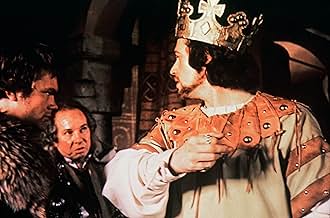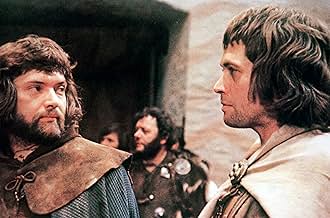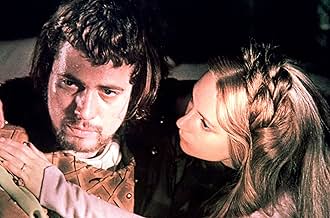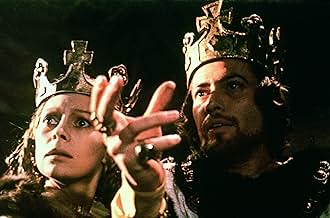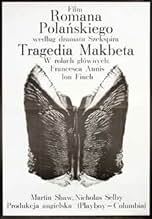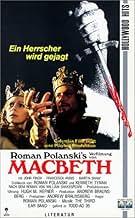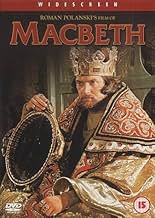A ruthlessly ambitious Scottish lord seizes the throne with the help of his scheming wife and a trio of witches.A ruthlessly ambitious Scottish lord seizes the throne with the help of his scheming wife and a trio of witches.A ruthlessly ambitious Scottish lord seizes the throne with the help of his scheming wife and a trio of witches.
- Director
- Writers
- Stars
- Won 1 BAFTA Award
- 3 wins & 2 nominations total
- Director
- Writers
- All cast & crew
- Production, box office & more at IMDbPro
Featured reviews
How does one do justice to one of the most nihilistic murderers in the history of drama? Even Richard the Third has a sense of humor. but once MacBeth buys into the witch's prophecy (which he doesn't have to do) - it's all straight to hell from there. Even his wife finally gets the idea that 'When you choose to ride the tiger, you don't get off' as one Confucian wit put it, long ago....
This is the film that put an end to the "high-school" Shakespeare that we all had to suffer through in the 1960s. That Shakespeare was dull, lifeless, meaninglessly conservative - everyone hated him. In America, we had heard about Peter Brooks, and about an all-nude MacBeth (which of course never happened, the reference was to the "out damn spot' scene, just as we see in this movie); and there were the legendary Orson Welles versions that were, unfortunately, wholly unavailable at the time. Then Zeffirelli made his Romeo and Juliet, showing Romeo's bare butt, even in the ad for the film, and we started getting the glimmer that Shakespeare had been a real person writing about other real people - then came Polanski's MacBeth.
I won't lie and tell you that this is the definitive MacBeth - or even that it's a really great movie - all of the actors seem like they are way over their heads in this material.
But Polanski's purely cinematic bravado pulls it off. Right from the beginning, watching a medieval warrior beat his opponent into a bloody pulp, we are drawn into a world where violence is the only truth we can believe - pretty much as MacBeth himself sees it.
From this point on, there was no turning back. The Shakespeare we inherit from this film may not be the one we want, but he is certainly a playwright of Elizabethan England (which the "high-school" Shakespeare never was).
That makes this film really important - at least until the definitive version actually gets made (and it hasn't, yet...).
This is the film that put an end to the "high-school" Shakespeare that we all had to suffer through in the 1960s. That Shakespeare was dull, lifeless, meaninglessly conservative - everyone hated him. In America, we had heard about Peter Brooks, and about an all-nude MacBeth (which of course never happened, the reference was to the "out damn spot' scene, just as we see in this movie); and there were the legendary Orson Welles versions that were, unfortunately, wholly unavailable at the time. Then Zeffirelli made his Romeo and Juliet, showing Romeo's bare butt, even in the ad for the film, and we started getting the glimmer that Shakespeare had been a real person writing about other real people - then came Polanski's MacBeth.
I won't lie and tell you that this is the definitive MacBeth - or even that it's a really great movie - all of the actors seem like they are way over their heads in this material.
But Polanski's purely cinematic bravado pulls it off. Right from the beginning, watching a medieval warrior beat his opponent into a bloody pulp, we are drawn into a world where violence is the only truth we can believe - pretty much as MacBeth himself sees it.
From this point on, there was no turning back. The Shakespeare we inherit from this film may not be the one we want, but he is certainly a playwright of Elizabethan England (which the "high-school" Shakespeare never was).
That makes this film really important - at least until the definitive version actually gets made (and it hasn't, yet...).
I remember watching this film in my Grade 11 English class when we were studying William Shakespeare's "Macbeth". Reading the story a couple of times, I rather enjoyed the classic tale to a degree. Whether or not it would convincingly translate to film, I, along with my class, was about to find out...with Roman Polanski's 1971 film adaptation, also produced by - HUGH HEFNER?!? As strangely amusing as the "Playboy" credit seemed in the opening credits, we were prepared for a very interesting take on the famous, violent play.
Shakespearean tragedies/comedies being translated to film are nothing new, of course. There have been some clear hits and misses over the decades - but fortunately, "Macbeth" does not fall into that latter "miss" category, for it is a tremendously underrated, very surprising, and overall competently made film. Roman Polanski is an excellent director here, and the acting, music, and effects (some of which - particularly the "dagger/murder" sequence - perversely amused my fellow classmates, who are obviously jaded by today's overblown, unsubtle, effects-laden "dramas") worked well for me. As well, the graphic violent and sexual nature of the film (which was also sometimes entertaining to the class, sadly) shocked me quite a bit. Of course, for a film made in 1971, Polanski's "Macbeth" isn't exactly "tame", if you will. Apparently it was rated X at the time, when the notorious film rating existed. I'm not sure if that's true or not, but it clearly wouldn't be surprising if it were, especially considering how intense this film can get - both physically and psychologically. It works extremely well as an old-fashioned action-packed thriller, and even to someone who knew the story fairly well, it was an exciting little soap opera to behold. The class really enjoyed it as well, I'm glad to say; even for all its "old" qualities (i.e. the twangy psychadelic-sounding music that plays upon the closing credits) it still achieved a certain charm that was impossible to deny.
One of the most impressive and enjoyable Shakespearean films I have ever seen, "Macbeth" deserves much more acclaim than scorn - for it is well-made, and enormously faithful to its original source, capturing all the details of ol' Scotland and its inhabitants with great care. It's a wonderful treat. Highly recommended.
Shakespearean tragedies/comedies being translated to film are nothing new, of course. There have been some clear hits and misses over the decades - but fortunately, "Macbeth" does not fall into that latter "miss" category, for it is a tremendously underrated, very surprising, and overall competently made film. Roman Polanski is an excellent director here, and the acting, music, and effects (some of which - particularly the "dagger/murder" sequence - perversely amused my fellow classmates, who are obviously jaded by today's overblown, unsubtle, effects-laden "dramas") worked well for me. As well, the graphic violent and sexual nature of the film (which was also sometimes entertaining to the class, sadly) shocked me quite a bit. Of course, for a film made in 1971, Polanski's "Macbeth" isn't exactly "tame", if you will. Apparently it was rated X at the time, when the notorious film rating existed. I'm not sure if that's true or not, but it clearly wouldn't be surprising if it were, especially considering how intense this film can get - both physically and psychologically. It works extremely well as an old-fashioned action-packed thriller, and even to someone who knew the story fairly well, it was an exciting little soap opera to behold. The class really enjoyed it as well, I'm glad to say; even for all its "old" qualities (i.e. the twangy psychadelic-sounding music that plays upon the closing credits) it still achieved a certain charm that was impossible to deny.
One of the most impressive and enjoyable Shakespearean films I have ever seen, "Macbeth" deserves much more acclaim than scorn - for it is well-made, and enormously faithful to its original source, capturing all the details of ol' Scotland and its inhabitants with great care. It's a wonderful treat. Highly recommended.
"The Tragedy of Macbeth" (simply abbreviated "Macbeth" on most video covers) is a violent retelling of Shakespeare's classic story. Macbeth (Jon Finch), the Scottish Thane of Glamis, conspires with his wife Lady Macbeth (and three strange witches) to kill the widely-respected King Duncan. After committing the awful deed, Macbeth begins hallucinating, hearing strange omens of death and haunting words; his wife similarly becomes worried with Macbeth's bloodlust, and Duncan's son convinces himself that Macbeth was involved in some way with the killing.
"Macbeth" is a true tragedy, and chances are you already know a great deal about it as it seems to be a high school requirement that it be read by all students. The remarkable thing about Roman Polanski's movie is that it is not only a painfully accurate retelling of William Shakespeare's story, but doesn't flinch when it comes to violence.
According to IMDb's trivia section (and I can't honestly say how reliable this information is, mind you), Polanski included very violent scenes (such as Duncan's death, which is NOT detailed in the original text) because the movie was filmed around the same time period of Sharon Tate's brutal murder, and it was Polanski's way of venting stress and anger. One must imagine what happens to Duncan in this film is what Polanski wanted to do to the Manson family members (and you certainly can't blame him).
As such, knowing the circumstances of what brought about the violence, it is more forgivable and certainly maintains a haunting element - some kind of historical relic, just in knowing that it was filmed during such a terrible time in Polanski's life.
The movie as a whole is wonderful. As I mentioned above, its accuracy (in comparison to Shakespeare's text) is spot-on -- entire scenes of dialogue are taken directly from the source, and even the strong violence lends the film a more realistic nature.
Overall, it's an epic and (sadly) somewhat forgotten Shakespeare epic. If you enjoyed "Hamlet" or "Romeo and Juliet" (the '60s version) you'll certainly find this engaging, and - at times - rather shocking, too.
"Macbeth" is a true tragedy, and chances are you already know a great deal about it as it seems to be a high school requirement that it be read by all students. The remarkable thing about Roman Polanski's movie is that it is not only a painfully accurate retelling of William Shakespeare's story, but doesn't flinch when it comes to violence.
According to IMDb's trivia section (and I can't honestly say how reliable this information is, mind you), Polanski included very violent scenes (such as Duncan's death, which is NOT detailed in the original text) because the movie was filmed around the same time period of Sharon Tate's brutal murder, and it was Polanski's way of venting stress and anger. One must imagine what happens to Duncan in this film is what Polanski wanted to do to the Manson family members (and you certainly can't blame him).
As such, knowing the circumstances of what brought about the violence, it is more forgivable and certainly maintains a haunting element - some kind of historical relic, just in knowing that it was filmed during such a terrible time in Polanski's life.
The movie as a whole is wonderful. As I mentioned above, its accuracy (in comparison to Shakespeare's text) is spot-on -- entire scenes of dialogue are taken directly from the source, and even the strong violence lends the film a more realistic nature.
Overall, it's an epic and (sadly) somewhat forgotten Shakespeare epic. If you enjoyed "Hamlet" or "Romeo and Juliet" (the '60s version) you'll certainly find this engaging, and - at times - rather shocking, too.
THE PLOT: Through ambition, greed, and the spurring of his wife a man rises to the ranks of King, but leaves murder, destruction, guilt, and a wide array of enemies in his wake.
THE POSITIVE: This is visually stunning from beginning to end. The photography of the Scottish landscape seems almost surreal. Although some may argue that the violence is excessive it is still well done and works in a nice lyrical fashion with the script. The gory special effects are very realistic and top anything that I have seen in any slasher movie especially the decapitation scene. The witches also come off as looking very frightening here. The scene in their coven where you see dozens of fully nude elderly women is grotesquely brilliant. This is one Shakespeare rendition that doesn't have any of the stiff staginess. The characters seem to be having real conversations and their lines are spoken in a much more natural way. Finch is absolutely perfect in the lead. The facial expressions that he show during Macbeth's different phases are fascinating and right on target. This would be a good version to show to teenagers and others who might not ordinarily be into Shakespeare. The action is well mounted and paced so anyone would be able to follow it even if they are not able to completely grasp the language.
THE NEGATIVE: Outside of a relentlessly bleak visual style that may be too much for some there really isn't anything negative about it.
THE LOWDOWN: This is the best film adaptation to Shakespeare's work that I have seen. It is exciting, graphic, realistic, visual, and captivating all at the same time even for those that may not be into Shakespeare.
THE RATING: 8 out of 10.
THE POSITIVE: This is visually stunning from beginning to end. The photography of the Scottish landscape seems almost surreal. Although some may argue that the violence is excessive it is still well done and works in a nice lyrical fashion with the script. The gory special effects are very realistic and top anything that I have seen in any slasher movie especially the decapitation scene. The witches also come off as looking very frightening here. The scene in their coven where you see dozens of fully nude elderly women is grotesquely brilliant. This is one Shakespeare rendition that doesn't have any of the stiff staginess. The characters seem to be having real conversations and their lines are spoken in a much more natural way. Finch is absolutely perfect in the lead. The facial expressions that he show during Macbeth's different phases are fascinating and right on target. This would be a good version to show to teenagers and others who might not ordinarily be into Shakespeare. The action is well mounted and paced so anyone would be able to follow it even if they are not able to completely grasp the language.
THE NEGATIVE: Outside of a relentlessly bleak visual style that may be too much for some there really isn't anything negative about it.
THE LOWDOWN: This is the best film adaptation to Shakespeare's work that I have seen. It is exciting, graphic, realistic, visual, and captivating all at the same time even for those that may not be into Shakespeare.
THE RATING: 8 out of 10.
Roman Polanski's blood-soaked version of Shakespeare's Scottish play was the video version of choice when we were studying this at school, in spite of it having a nude Lady Macbeth and witches (and Keith Chegwin in the cast - he's Banquo's son).
Jon Finch has the lead and he is exceptionally good. Even a dagger which really appears to float before him (an effect not needed) doesn't spoil things. Odd that he never really got good movie roles after this. His Lady M is Francesca Annis, a spider of a schemer, also putting in a good performance.
Less adequate are Martin Shaw as Banquo, Stephan Chase as Malcolm, and Sydney Bromley as the Porter, although Terence Bayler gives good value as Macduff.
Perhaps this Macbeth is the first one to be truly cinematic, something that even Orson Welles couldn't achieve with Scots accents and Scandinavian settings. It remains memorable long after seeing and, in its excesses, opens up the text for a new generation, and finally, sees the repellent murdering usurper get what he deserves.
(Incidentally for perspective, the book 'Macbeth - man and myth' by Nick Aitchison looks at the real historic facts in accessible coffee-table book style).
Jon Finch has the lead and he is exceptionally good. Even a dagger which really appears to float before him (an effect not needed) doesn't spoil things. Odd that he never really got good movie roles after this. His Lady M is Francesca Annis, a spider of a schemer, also putting in a good performance.
Less adequate are Martin Shaw as Banquo, Stephan Chase as Malcolm, and Sydney Bromley as the Porter, although Terence Bayler gives good value as Macduff.
Perhaps this Macbeth is the first one to be truly cinematic, something that even Orson Welles couldn't achieve with Scots accents and Scandinavian settings. It remains memorable long after seeing and, in its excesses, opens up the text for a new generation, and finally, sees the repellent murdering usurper get what he deserves.
(Incidentally for perspective, the book 'Macbeth - man and myth' by Nick Aitchison looks at the real historic facts in accessible coffee-table book style).
Did you know
- TriviaMark Dightam, who was eleven when he controversially appeared full frontally naked as MacDuff's son, was not allowed to see the film when it was released because it had been classified AA and he was under 14 at the time.
- GoofsThe lyrics to the song that Fleance sings at Macbeth's banquet for Duncan at Inverness are taken from the poem "Merciles Beautè" by Geoffrey Chaucer. In the context of the film this extraneously inserted song is itself an anachronism, as Chaucer lived in the fourteenth century and Shakespeare's "Macbeth" historically takes place in the eleventh century.
- ConnectionsFeatured in Aquarius: Two Macbeths/Hayward Gallery/Ravi Shankar (1972)
Details
- Release date
- Countries of origin
- Official site
- Language
- Also known as
- Bi Kịch Của Macbeth
- Filming locations
- Lindisfarne Castle, Holy Island of Lindisfarne, Northumberland, England, UK(Glamis Castle, Inverness)
- Production companies
- See more company credits at IMDbPro
Box office
- Budget
- $3,100,000 (estimated)
- Runtime2 hours 20 minutes
- Color
- Aspect ratio
- 2.35 : 1
Contribute to this page
Suggest an edit or add missing content



